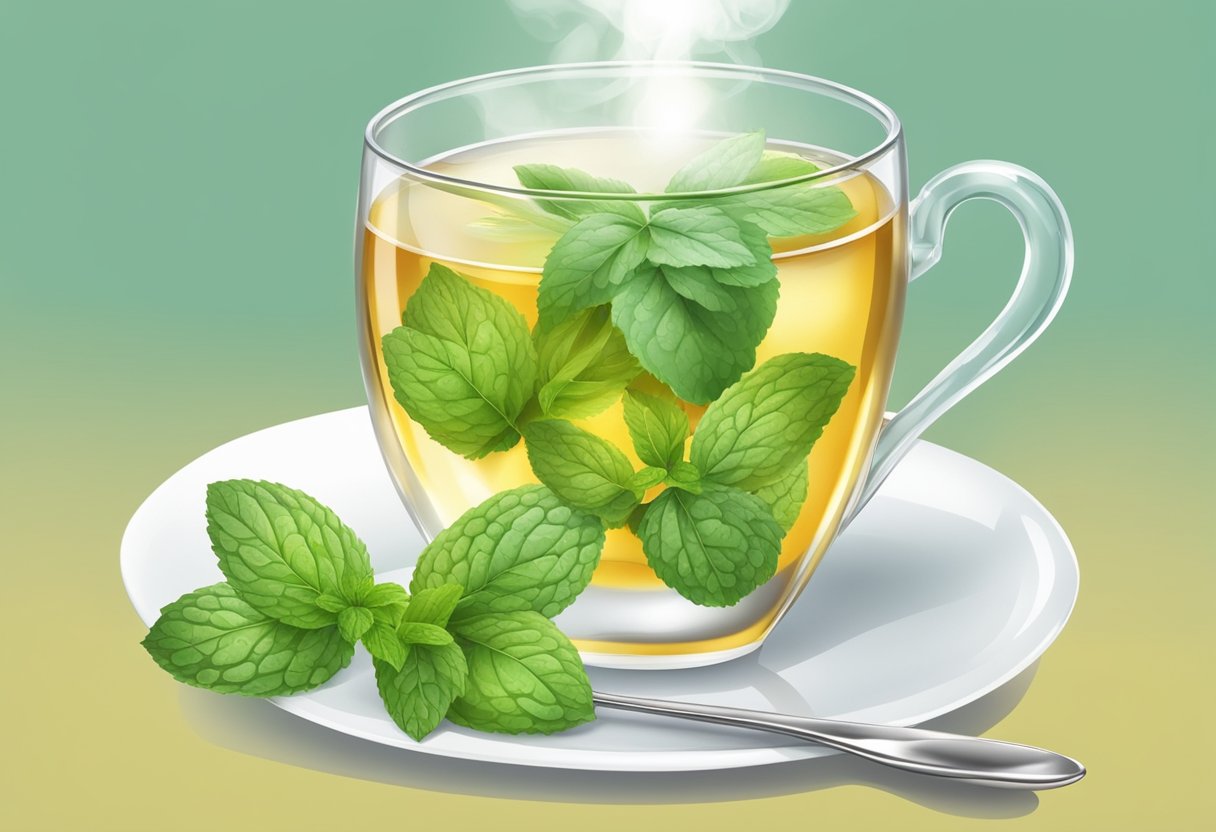Breastfeeding can be a challenge for many new mothers, and they often seek ways to increase their milk supply and ensure breastfeeding success. While there are many factors that can impact milk supply, including a mother’s diet, hydration, and stress levels, some mothers turn to herbs for breastfeeding to help increase their milk production and success.
Disclaimer: This article is provided for informational purposes only and should not replace professional medical advice. Please consult with a qualified healthcare practitioner or herbalist before using any herbal remedies.

Herbs have been used for centuries to promote lactation and improve breastfeeding success, and many modern mothers still rely on them today. However, it is important to understand which herbs are safe and effective, and which ones should be avoided during breastfeeding. Consulting with a lactation consultant or healthcare provider can help mothers navigate the world of herbal remedies and make informed choices to support their breastfeeding journey.
Key Takeaways
- Herbal remedies have been used for centuries to promote lactation and improve breastfeeding success.
- Consulting with a lactation consultant or healthcare provider can help mothers make informed choices about herbal remedies.
- It is important to understand which herbs are safe and effective, and which ones should be avoided during breastfeeding.
Understanding Breastfeeding and Milk Supply

Breastfeeding is an essential process for newborns and infants as it provides all the necessary nutrients and antibodies required for their growth and development. However, some new mothers may face challenges in producing enough breast milk to meet their baby’s needs. This condition is known as low milk supply or low milk production.
Several factors can contribute to low milk supply, including hormonal imbalances, certain medications, stress, and lack of proper breastfeeding techniques. In some cases, it may be due to medical conditions such as polycystic ovary syndrome (PCOS) or thyroid disorders.
It is essential to understand that the amount of breast milk produced is not an indication of a mother’s ability to breastfeed. Instead, it is influenced by the baby’s demand for milk. The more the baby feeds, the more milk the mother will produce. Therefore, it is crucial to establish a proper breastfeeding routine and ensure the baby feeds frequently.
There are several ways to boost milk supply naturally, including the use of herbs. Some herbs, such as fenugreek, blessed thistle, and fennel, have been traditionally used to enhance milk production. However, it is essential to note that the effectiveness of these herbs varies from person to person, and their safety during breastfeeding is not well-established.
In conclusion, understanding the basics of breastfeeding and milk supply is crucial for new mothers to ensure they produce enough breast milk to meet their baby’s needs. While herbs may be helpful in boosting milk production, it is essential to consult a healthcare provider before using them to ensure their safety and effectiveness.
Role of Herbal Remedies in Breastfeeding Success
Many women experience difficulties with breast milk production during the early postpartum period. Herbal remedies have been used for centuries to help increase milk supply and support successful breastfeeding.
Herbal supplements, also known as herbal galactagogues, have been shown to be effective in increasing milk production in some women. One study found that fenugreek, an herb commonly used for this purpose, was associated with a significant increase in milk volume in breastfeeding mothers. Other herbs that have been traditionally used as galactagogues include fennel, blessed thistle, and goat’s rue.
Herbal teas are another popular way to consume herbs for breastfeeding support. Many herbal teas contain galactagogues such as fenugreek, fennel, and nettle. However, it is important to note that not all herbal teas are safe for breastfeeding mothers and their infants. Some herbs, such as sage and peppermint, can actually decrease milk supply and should be avoided.
Herbal products and treatments can also be used to support breastfeeding success. For example, herbal lactation supplements may contain a combination of galactagogues and other herbs to support milk production and overall lactation health. Some natural herbs, such as chamomile and lavender, may also be used to help reduce stress and promote relaxation, which can have a positive impact on milk supply.
While herbal remedies can be a helpful tool for breastfeeding mothers, it is important to consult with a healthcare provider before using any herbal product or treatment. Some herbs may interact with medications or have side effects, and it is important to ensure that any herbal remedy used is safe for both the mother and her infant.
Common Herbs for Breastfeeding Success
Breastfeeding is a natural process, but it can be challenging for some women. Many herbs have been used for centuries to support lactation and improve milk supply. Here are some of the most common herbs used for breastfeeding success:
Fenugreek (Trigonella foenum-graecum)
Fenugreek is one of the most popular herbs used to increase milk supply. It contains phytoestrogens that can stimulate milk production. Fenugreek can be taken as a tea, capsule, or tincture. However, it is important to note that fenugreek can cause gastrointestinal upset in some women and should be avoided by those with peanut allergies.
Blessed Thistle (Cnicus benedictus)
Blessed thistle is another herb that has been traditionally used to support lactation. It is believed to stimulate milk production and improve the flow of milk. Blessed thistle can be taken as a tea, capsule, or tincture. However, it should be avoided by women with a history of hormone-sensitive cancers.
Alfalfa (Medicago sativa)
Alfalfa is a nutrient-rich herb that has been used to support lactation. It contains vitamins and minerals that can help improve milk production. Alfalfa can be taken as a tea or capsule.
Fennel (Foeniculum vulgare)
Fennel is a flavorful herb that has been used for centuries to support lactation. It is believed to stimulate milk production and improve the flow of milk. Fennel can be taken as a tea, capsule, or tincture.
Nettle (Urtica dioica)
Nettle is a nutrient-rich herb that has been used to support lactation. It contains vitamins and minerals that can help improve milk production. Nettle can be taken as a tea or capsule.
Goat’s Rue (Galega officinalis)
Goat’s rue is an herb that has been traditionally used to support lactation. It is believed to stimulate milk production and improve the flow of milk. Goat’s rue can be taken as a tea or capsule.
Shatavari (Asparagus racemosus)
Shatavari is an herb that has been traditionally used in Ayurvedic medicine to support lactation. It is believed to stimulate milk production and improve the flow of milk. Shatavari can be taken as a tea, capsule, or tincture.
Anise (Pimpinella anisum)
Anise is a flavorful herb that has been used for centuries to support lactation. It is believed to stimulate milk production and improve the flow of milk. Anise can be taken as a tea, capsule, or tincture.
Milk Thistle (Silybum marianum)
Milk thistle is an herb that has been traditionally used to support liver health. It is believed to improve milk supply by supporting liver function. Milk thistle can be taken as a tea or capsule.
Brewer’s Yeast
Brewer’s yeast is a nutritional supplement that has been used to support lactation. It is believed to improve milk production by providing essential nutrients. Brewer’s yeast can be taken as a powder or capsule.
In conclusion, many herbs have been traditionally used to support lactation and improve milk supply. However, it is important to consult with a healthcare provider before using any herbs while breastfeeding. Some herbs may have side effects or interact with medications.
Understanding Herbal Galactagogues
Herbal galactagogues are natural substances that are believed to increase milk production in lactating women. They have been used for centuries by various cultures around the world to promote breastfeeding success. Unlike traditional galactagogues, which are typically prescription medications, herbal galactagogues are available over-the-counter and are generally considered safe for use by breastfeeding mothers.
One of the most common herbal galactagogues is fenugreek, which has been shown to increase milk production in some women. Other popular herbs used as galactagogues include fennel, blessed thistle, and milk thistle. While these herbs are generally considered safe, it is important to note that they can have side effects and may interact with other medications.
It is not entirely clear how herbal galactagogues work to increase milk production. Some experts believe that they stimulate the production of prolactin, a hormone that plays a key role in lactation. Others believe that they work by increasing blood flow to the breasts, which can help to stimulate milk production.
Despite their long history of use, there is limited scientific research on the effectiveness of herbal galactagogues. While some studies have shown that these herbs can increase milk production in some women, others have found no significant effect. As with any supplement or medication, it is important to talk to a healthcare provider before using herbal galactagogues to ensure that they are safe and appropriate for individual needs.
Safety and Precautions with Herbal Remedies

Breastfeeding mothers may consider using herbal remedies to increase milk production or to alleviate common breastfeeding problems. However, it is essential to understand the safety and precautions associated with using herbs during breastfeeding.
Firstly, it is crucial to consult with a healthcare provider before using any herbal remedies. Some herbs may interact with medications or have adverse effects on the mother or baby. Healthcare providers can help determine if an herb is safe to use and in what dosage.
Secondly, it is important to be aware of the active ingredients in the herbs. Some herbs contain pyrrolizidine alkaloids, which can be harmful to the liver. It is crucial to avoid herbs that contain these alkaloids, such as comfrey and coltsfoot.
Thirdly, some herbs are considered safe for breastfeeding mothers to use, such as fenugreek, fennel, and milk thistle. However, even safe herbs can have possible side effects, such as gastrointestinal upset or allergic reactions. It is crucial to start with a low dosage and monitor for any adverse effects.
Lastly, it is essential to consider the source of the herbs. Herbal remedies are not regulated in the same way as medications, and the quality and purity of the herbs can vary. It is essential to purchase herbs from a reputable source to ensure their safety and effectiveness.
In summary, while herbal remedies can be useful for breastfeeding mothers, it is crucial to take safety and precautions seriously. Consulting with a healthcare provider, understanding the active ingredients in the herbs, starting with a low dosage, and purchasing herbs from a reputable source can help ensure the safety and effectiveness of using herbs during breastfeeding.
Consulting with a Lactation Consultant
A lactation consultant is a healthcare practitioner who specializes in breastfeeding support. They can help mothers with a wide range of breastfeeding issues, including low milk supply, latching difficulties, and nipple pain. Consulting with a lactation consultant can be an excellent way to improve breastfeeding success and ensure that both mother and baby are healthy and happy.
Lactation consultants have extensive training and experience in breastfeeding support. They can provide mothers with personalized advice and guidance on breastfeeding techniques, as well as recommendations for herbs and other natural remedies that can help improve milk supply and overall breastfeeding success.
What to Expect
During a consultation with a lactation consultant, the practitioner will typically begin by assessing the mother’s breastfeeding experience and any issues or concerns she may be experiencing. They may observe a feeding session to assess the baby’s latch and milk transfer, as well as evaluate the mother’s milk supply. Based on this assessment, the lactation consultant will provide personalized recommendations for improving breastfeeding success.
One of the benefits of consulting with a lactation consultant is that they can provide mothers with evidence-based information on herbs and other natural remedies for improving milk supply and breastfeeding success. They can also help mothers navigate the often-confusing world of herbal remedies, providing guidance on safe dosages and potential side effects.
In addition to providing personalized advice and guidance, lactation consultants can also connect mothers with other resources and support groups in their community. This can be especially helpful for new mothers who may be feeling overwhelmed or isolated.
Overall, consulting with a lactation consultant can be an excellent way to improve breastfeeding success and ensure that both mother and baby are healthy and happy. Lactation consultants are knowledgeable, experienced, and neutral practitioners who can provide personalized advice and guidance on breastfeeding techniques, as well as recommend herbs and other natural remedies that can help improve milk supply and overall breastfeeding success.
Impact of Herbs on Breast Milk Quality

Breastfeeding mothers are often concerned about the quality of their breast milk. Some herbs are believed to have a positive impact on breast milk quality, while others may have a negative effect.
Fenugreek is a popular herb used to increase breast milk production. It is believed to stimulate the production of prolactin, a hormone that helps to increase milk supply. However, there is limited scientific evidence to support the use of fenugreek for this purpose.
Blessed thistle is another herb that is believed to increase milk supply. It is thought to work by stimulating the production of milk-producing hormones. However, there is limited scientific evidence to support the use of blessed thistle for this purpose.
On the other hand, some herbs may have a negative impact on breast milk quality. For example, sage is known to decrease milk supply and may also affect the taste of breast milk. Peppermint and spearmint are also believed to decrease milk supply.
It is important for breastfeeding mothers to be cautious when using herbs to improve breast milk quality. They should always consult with a healthcare provider before using any new herbs or supplements. Additionally, they should be aware of potential side effects and discontinue use if they experience any adverse reactions.
Overall, while some herbs may have a positive impact on breast milk quality, there is limited scientific evidence to support their use. Breastfeeding mothers should always prioritize a healthy diet and lifestyle to ensure the best possible quality of breast milk for their baby.
Scientific Studies on Herbal Remedies for Breastfeeding

There have been several scientific studies conducted on the effectiveness of herbal remedies for improving breastfeeding success. These studies have focused on various herbs and their impact on breast milk production, infant weight gain, and maternal satisfaction.
One study published in the Journal of Human Lactation found that fenugreek, a popular herb used to increase breast milk supply, was effective in improving milk volume and infant weight gain in breastfeeding mothers. Another study published in BMC Complementary and Alternative Medicine found that using a combination of herbs, including fenugreek, fennel, and goat’s rue, improved milk production and infant weight gain in mothers with low milk supply.
A randomized controlled trial published in the Journal of Alternative and Complementary Medicine found that mothers who received an herbal supplement containing fenugreek and other herbs had a significant increase in milk volume compared to those who received a placebo. The study also found that infants whose mothers received the herbal supplement had higher weight gain compared to those whose mothers received the placebo.
A review of clinical studies published in the Journal of Obstetric, Gynecologic, and Neonatal Nursing found that several herbs, including fenugreek, fennel, and milk thistle, were effective in improving milk production and infant weight gain in breastfeeding mothers. The review also found that using herbal remedies was generally safe and well-tolerated by mothers and infants.
Overall, these scientific studies suggest that herbal remedies can be effective in improving breastfeeding success. However, it is important for mothers to consult with their healthcare provider before using any herbal supplements, as some herbs may have potential side effects or interact with medications.
Traditional Use of Herbs for Breastfeeding

Herbs have been used for centuries in various cultures to support lactation and promote breastfeeding success. Traditional medicines have a long history of use in many cultures, and the use of herbs for breastfeeding is no exception.
In traditional Chinese medicine, herbs such as fenugreek, fennel, and anise are commonly used to promote milk production. These herbs are believed to have a warming effect on the body and to stimulate the production of breast milk. In Ayurvedic medicine, herbs such as shatavari and ashwagandha are used to support lactation and promote milk flow.
In Western herbal medicine, herbs such as blessed thistle, nettle, and alfalfa are often used to promote milk production. These herbs are believed to be rich in nutrients that support lactation and to have a toning effect on the uterus.
While there is a long history of traditional use of herbs for breastfeeding, it is important to note that scientific evidence on the effectiveness and safety of these herbs is limited. Some herbs may have side effects or interact with medications, and it is important to consult with a healthcare provider before using any herbal supplement.
In addition, it is important to note that while herbs may be helpful in supporting lactation, they should not be used as a substitute for proper breastfeeding techniques and support. Lactation consultants, support groups, and other resources are available to help mothers overcome breastfeeding challenges and promote successful breastfeeding.
Conclusion

In conclusion, there are several herbs that can be used to support breastfeeding success. The efficacy of Chinese herbal medicine Zengru Gao has been demonstrated in a multicenter randomized controlled trial, which showed that it enhanced breastfeeding success during the first week postpartum [1]. Similarly, the use of galactagogue herbal tea has been found to be useful for increasing breast milk production and promoting short-term catch-up of birth weight in the first week of life [3].
Complementary medicine, including the use of herbal supplements, has also been reported to be helpful in addressing issues associated with successful breastfeeding in the postpartum period [2]. However, more research is needed to reach a definitive conclusion on the benefits of complementary medicine in breastfeeding.
Moreover, a comparative study on the effects of “honey and fenugreek” with “fenugreek” on breastfeeding success showed that the combination of honey with fenugreek significantly increased breastfeeding success [4]. It is important to note that while herbal medicines can be helpful in enhancing breastfeeding, they should be used with caution and under the guidance of a healthcare provider.
Healthcare providers have an important role to play in ensuring the safe and appropriate use of herbal products by breastfeeding mothers. They should provide evidence-based information and access to high-quality herbal products to ensure a safe and successful breastfeeding experience [5].
Overall, the use of herbs for breastfeeding success is a promising area of research, but more studies are needed to fully understand their potential benefits and risks. It is important for breastfeeding mothers to consult with their healthcare providers before using any herbal products.
[1] https://bmccomplementmedtherapies.biomedcentral.com/articles/10.1186/s12906-018-2121-0
[2] https://brieflands.com/articles/ijp-80180.html
[3] https://www.liebertpub.com/doi/abs/10.1089/acm.2010.0090
[4] https://www.hindawi.com/journals/ecam/2022/6048280/
[5] https://www.sciencedirect.com/science/article/pii/S1744388118307497







